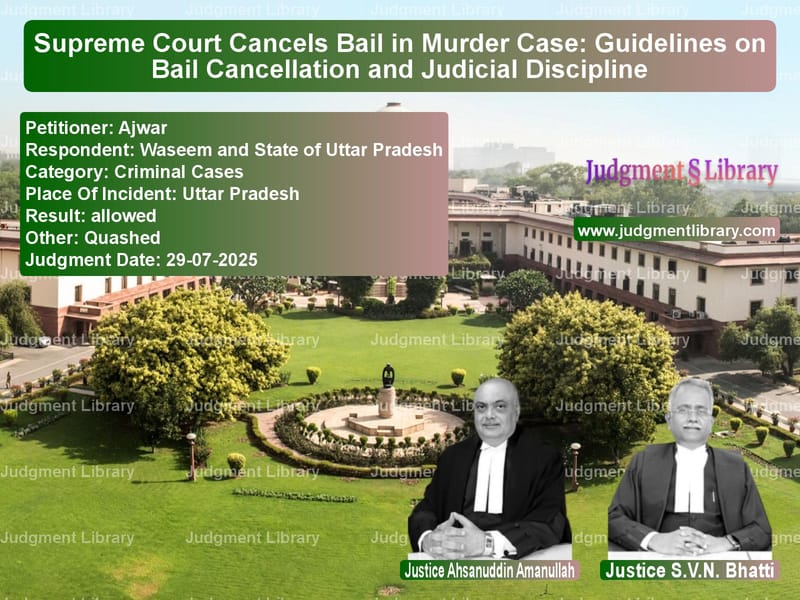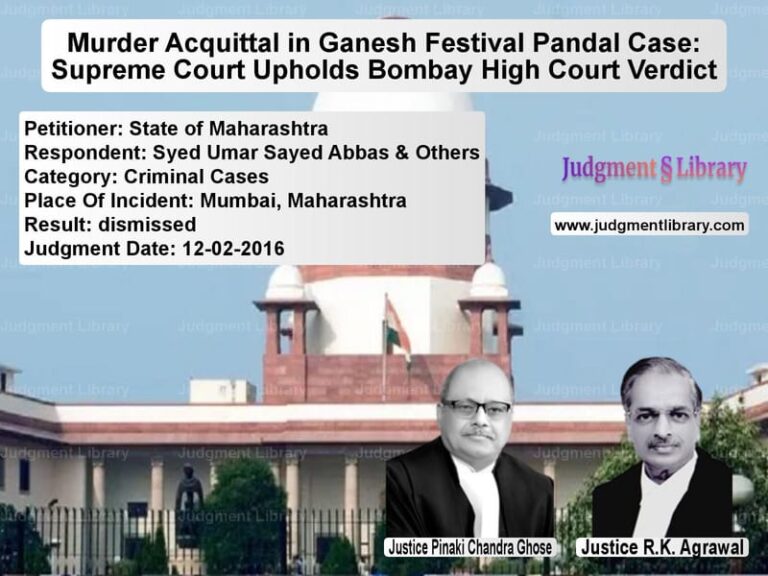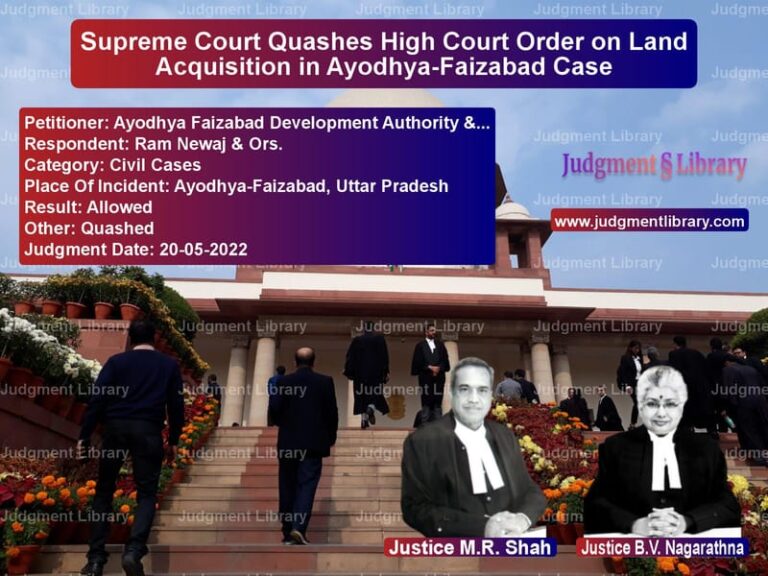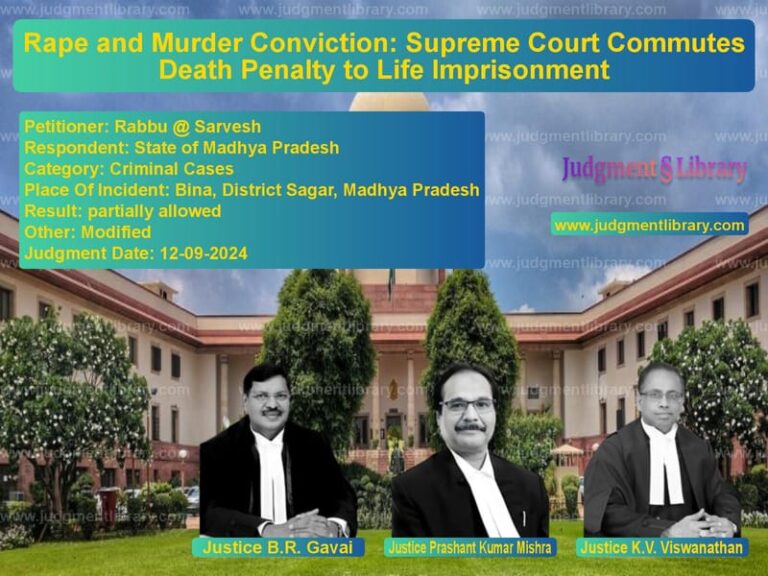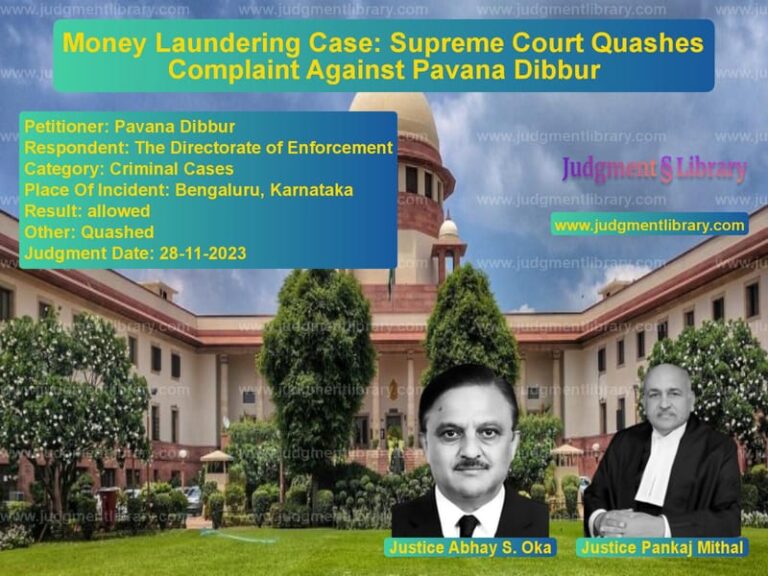Supreme Court Cancels Bail in Murder Case: Guidelines on Bail Cancellation and Judicial Discipline
In a significant ruling that underscores the importance of judicial discipline and proper application of bail principles, the Supreme Court of India recently delivered a judgment that has far-reaching implications for criminal jurisprudence. The case involved a complex legal battle spanning multiple years, where the apex court had to intervene repeatedly to ensure that justice was served properly.
The matter began with a criminal case registered under Sections 147, 148, 149, 352, 302, 307, 504 and 34 of the Indian Penal Code, 1860. The appellant, Ajwar, had filed the case as an informant, while respondent Waseem was one of the accused seeking bail. What followed was a legal saga that saw the case moving between the trial court, the High Court, and the Supreme Court multiple times, creating a complex web of judicial proceedings that tested the boundaries of bail jurisprudence.
The Supreme Court, in its judgment dated July 29, 2025, delivered by Justices Ahsanuddin Amanullah and S.V.N. Bhatti, made crucial observations about how higher courts must treat judgments of the Supreme Court and what constitutes proper reasoning while granting bail, especially in serious criminal cases.
The Legal Battle Unfolds
The case had a long history before it reached the Supreme Court for the final decision. Initially, when bail was granted to respondent Waseem by the High Court on August 22, 2022, the appellant moved the Supreme Court, which interfered with the bail order and remanded the matter back to the High Court. The High Court once again granted bail on December 7, 2022, leading the appellant to approach the Supreme Court again seeking cancellation of bail.
This time, in its judgment dated May 17, 2024, the Supreme Court allowed the appeal and cancelled the bail granted to respondent Waseem and others. However, the court kept a window open for fresh bail applications by observing: “It is also clarified that in the event of any new circumstances emerging, the respondents shall be entitled to apply for bail at a later stage.”
This observation became the foundation for the subsequent legal battle. Respondent Waseem applied for bail afresh before the trial court, which was rejected on January 20, 2025. He then moved the High Court in April 2025, and through the impugned order dated June 3, 2025, bail was granted once again, leading to the present appeal before the Supreme Court.
The Appellant’s Arguments
Learned counsel for the appellant presented compelling arguments challenging the High Court’s decision to grant bail. He submitted that “the Impugned Order not only suffers from material irregularities but also violates the tenor and spirit of the Judgment of this Court by which the bail granted to respondent no.1 was cancelled.”
The counsel emphasized that when the Supreme Court cancelled the bail of respondent Waseem, it had dealt with every aspect of the matter on merits. Therefore, whatever grounds were available to the respondent on that day stood closed, and the ‘new circumstances emerging’ could only be prospective in nature. The trial court had correctly appreciated this position and rejected the prayer for bail, while the High Court approached the matter as if it was considering the bail application for the first time.
The appellant’s counsel also highlighted several serious concerns. He pointed out that “when the High Court had granted bail earlier, respondent no.1 misused the privilege and committed various criminal acts, including intimidation and assault on the witnesses, for which a First Information Report was also lodged.” Additionally, the respondent had criminal antecedents, and the trial was already in progress and advancing at a relatively good pace.
Regarding the delay in trial, the counsel submitted that “whatever delay was being caused in trial, the same was on account of non-cooperation from the side of the accused.” In such circumstances, the normal course ought to have been a direction to the trial court to conclude the trial expeditiously rather than granting bail.
The Respondent’s Defense
Learned senior counsel for respondent Waseem presented arguments focusing on the principles of personal liberty and the requirements for cancellation of bail. He contended that “the basic principle for cancellation of bail is whether the person who is enlarged on bail had abused such indulgence/privilege and/or violated the terms of grant of bail, which, in the present case has not been done.”
The senior counsel emphasized that neither was the trial being hampered due to the grant of bail to respondent Waseem, nor had he indulged in any criminal activity, as there was no such allegation or case registered against him in this regard. He also argued that respondent Waseem was similarly situated to other co-accused whose bail had been upheld by the Supreme Court.
In a passionate appeal for personal liberty, the senior counsel submitted that “the Court may take a lenient view in the larger public interest, for, at the end of the day, if respondent no.1 is acquitted, the period spent behind bars by him cannot be returned.”
The respondent’s counsel also raised concerns about the investigation, stating that “a counter-case has also been filed by the accused in the present case for the same incident.” He pointed out that there were injuries on the side of the accused, but the concerned agencies, including the police, had not shown due diligence in pursuing the matter.
The Supreme Court’s Analysis and Reasoning
The Supreme Court began its analysis by emphasizing the importance of judicial discipline and the deference that must be shown to its judgments by all other courts. The court candidly stated that “the Impugned Order requires intercession.” It observed that “the scheme of the Constitution mandates that all Orders/Judgments of this Court have to be given due deference to by all other Courts, including the High Courts, in letter and in spirit.”
The court noted that in both earlier orders/judgments cancelling bail to respondent Waseem, the Supreme Court had examined all material aspects which the parties had argued in the present case. The Judgment dated May 17, 2024 was particularly significant as it had concluded that grant of bail was unjustified both on facts and in law, while keeping a limited window open for future applications based on new circumstances.
The Supreme Court then examined whether the ‘new circumstances’ projected by respondent Waseem before the High Court actually qualified as such. These included the period of custody (3 years and 2 months), the examination of four prosecution witnesses of fact, the grant of bail to similarly-situated accused, and allegations about the investigation in the cross-case.
However, what troubled the Supreme Court most was the reasoning employed by the High Court while granting bail. The court strongly objected to observations in the High Court’s order such as “‘one sided investigation by police’ and ‘ignoring the case of accused side'” which it found “thoroughly unwarranted” and having “absolutely no nexus with the prayer for bail.”
The Supreme Court also took exception to the High Court using “‘5-6 times overcrowding in jails’ as a ground to allow bail” given the heinous nature of the alleged offences. The court remarked that “‘an over-burdened docket is no justification for formulaic justice.'”
The Supreme Court clarified that while bail orders need not be long and lengthy, “it was incumbent upon the High Court to provide comprehensive reasoning, moreso, in light of this Court’s observation of future consideration of bail ‘at a later stage.'” The court distinguished between the requirement to avoid elaborate discussion of evidence and the necessity to provide cogent and germane reasoning.
The Final Verdict and Directions
After detailed analysis, the Supreme Court allowed the appeal and quashed the impugned order. The bail granted to respondent Waseem was set aside, and he was directed to surrender before the trial court within three weeks from the date of the judgment.
The Supreme Court also directed that “the Trial Court shall endeavour with full vigour to proceed on priority and conclude the trial expeditiously.” A copy of the order was directed to be dispatched to the concerned Registrar of the High Court for onward transmission to the trial court.
In a significant clarification, the court stated that its observations were confined to the legality of the impugned order and shall neither aid the prosecution nor prejudice the accused at trial.
Regarding the counter-case filed by the accused, the court observed that “it shall be open to the aggrieved person(s) to pursue their remedies in accordance with law before the appropriate forum, including the High Court.”
In response to the prayer by respondent’s senior counsel to maintain the liberty granted in the Judgment dated May 17, 2024 for renewing the prayer for bail, the Supreme Court found that “in the current scenario, the same would be unnecessary, as we have been informed that the majority of the prosecution witnesses have already been examined.”
Considering the chequered litigative history and attendant facts, the court clarified that “respondent no.1 shall remain in custody and not be enlarged on bail till the conclusion of the trial.” However, recognizing the gravity of this direction, the court provided a safeguard: “in case, genuinely, for reason(s) not attributable to respondent no.1, things are not taken to their logical conclusion expeditiously, he shall be at liberty to approach this Court directly for obtaining bail.”
Broader Implications
This judgment reinforces several important principles of criminal jurisprudence. First, it emphasizes that judgments of the Supreme Court must be respected and followed in letter and spirit by all courts. Second, it clarifies that while personal liberty is important, it cannot override considerations of justice, especially in serious criminal cases.
The judgment also serves as a reminder that bail orders must contain proper reasoning, particularly when the Supreme Court has previously cancelled bail in the same case. The grounds for granting bail must be relevant and substantial, not based on extraneous considerations like jail overcrowding in serious cases.
Furthermore, the judgment establishes that when the Supreme Court cancels bail after examining all aspects, the grounds available to the accused on that date stand closed, and only genuinely new circumstances can form the basis for fresh bail applications.
This case will likely serve as an important precedent for future cases involving bail cancellation and the proper exercise of judicial discretion in serious criminal matters. It strikes a careful balance between the fundamental right to personal liberty and the requirements of justice in cases involving serious offences.
Petitioner Name: Ajwar.Respondent Name: Waseem and State of Uttar Pradesh.Judgment By: Justice Ahsanuddin Amanullah, Justice S.V.N. Bhatti.Place Of Incident: Uttar Pradesh.Judgment Date: 29-07-2025.Result: allowed.
Don’t miss out on the full details! Download the complete judgment in PDF format below and gain valuable insights instantly!
Download Judgment: ajwar-vs-waseem-and-state-of-supreme-court-of-india-judgment-dated-29-07-2025.pdf
Directly Download Judgment: Directly download this Judgment
See all petitions in Bail and Anticipatory Bail
See all petitions in Murder Cases
See all petitions in Attempt to Murder Cases
See all petitions in Legal Malpractice
See all petitions in Other Cases
See all petitions in Judgment by Ahsanuddin Amanullah
See all petitions in Judgment by S.V.N. Bhatti
See all petitions in allowed
See all petitions in Quashed
See all petitions in supreme court of India judgments July 2025
See all petitions in 2025 judgments
See all posts in Criminal Cases Category
See all allowed petitions in Criminal Cases Category
See all Dismissed petitions in Criminal Cases Category
See all partially allowed petitions in Criminal Cases Category

